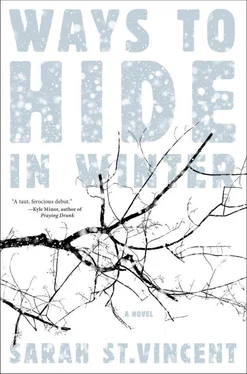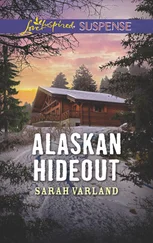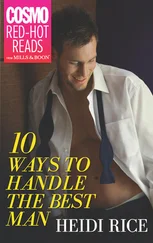“Yeah, I’ve always thought this would be a pretty comfortable place to do a dig,” another one said. “It’s got some great amenities. There’s a campsite right over there with hot showers and electric hookups.” He knocked the snow off his shoes, making loud thumping noises against the edge of the step.
“Hot showers on a dig site? I’m guessing the roads are paved with gold, too?” a third one said. He was older than most of the rest, and balding. His coat was a sleek, shiny gray-blue, and his feet were planted on the porch casually but firmly, as if no one had ever questioned his right to stand wherever he chose. When he spotted me, his smile widened.
“What do you think, girl? Look like a good day to be out in the woods to you?”
I turned toward him, too surprised at being addressed to react right away. Without replying, I moved automatically toward the door.
“Oh, you work here?” the same man said. “Maybe you could whip us up some burgers. You guys hungry?”
“I’m always hungry,” one of the ponytailed ones said.
“Okay. Got any burgers here, girl?”
They milled around on the porch as I stood there, asking myself fleetingly if I could refuse, if they would drive away if I did. They weren’t the cops, I could see that much, but something about them—the nice clothes, the colorless accents—gave off an authority that made me nervous.
“Yeah,” I said, trying to sound neutral.
“Listen to that,” the man in the gray-blue coat said. “‘Yeah.’ We’re in luck, gentlemen.”
I narrowed my eyes, fixing him with a silent, even look, but he didn’t seem to notice. I had no choice but to go in.
“I’ve heard the site’s almost untouched,” the same man, who seemed to be the leader, said. “Which is pretty remarkable, when you think about it. It got turned into a church camp after the government was done with it, but nobody’s really set foot in it since the seventies.”
He was talking about the prison camp, I realized as I bent to pull pink rounds of meat from the freezer. It was just down the road, a collection of collapsed, rotted roofs and broken slabs of cement scattered through the forest, connected by a thin footpath that dwindled by an old swimming hole choked with branches. I sometimes went there to think, to gather myself, usually after some out-of-town hiker had started asking too many questions. I had never seen it in winter, but in the summer it was like a jungle, its ruins melancholy and mysterious, like some lost temple to a pagan god.
One of the men who hadn’t spoken yet piped up as I put the meat on the hot surface, watching the ice crystals slowly break down. “I still can’t believe it—it’s so bizarre to think this happened, the War Department shipping a bunch of Axis guys off to some random place in Pennsylvania.”
“I know,” another one said behind me. “Eric tell you about the sweat box yet?”
“Yeah, I couldn’t believe that, either—that’s some straight-up Bridge on the River Kwai shit. I had no idea we did that.”
“Well, you can do anything if nobody knows you’re doing it. Look at those Abu Ghraib bastards.”
My back stiffened, but I was careful to move normally, as if I weren’t listening.
“Yeah, well, digital cameras. They should’ve known that would get out,” the leader remarked.
“Still, though. Kind of sickening, the whole thing.”
“What—that they did it, or that they took photos?”
“Well, both, obviously.” The speaker’s voice momentarily became louder. “Hey, could I get some onion rings with that? You got onion rings?”
I opened a bag and slipped them into the hot oil without speaking.
“Well, thank you very much, my lady,” the leader chimed in. I could feel him watching my back. “You ever hear of an archaeologist? You know what that is?”
I remained quiet at first, hoping the others would start a different conversation so I wouldn’t have to answer. But they didn’t. They all seemed to be waiting.
“Yes,” I said finally, not turning around.
“Oh, hey, how about that. What is it?”
“I beg your pardon?” I said.
“I said, what is it? Tell us what you think it means.”
I looked up at the fan that whirred over the grill, sucking the smoke away, up through the ceiling. The handle of the spatula was splintered, and I could feel a sharp piece digging into my palm. The meat kept bubbling, collapsing outward, browning.
“It’s someone who digs in the ground,” I told the fan. “Looking for artifacts.”
“There you go!” the man said, laughing and clapping his hands together, the gray-blue jacket making a slippery sound. “‘Someone who digs in the ground.’ Let’s go see if we can do a bit of digging in the ground, gentlemen.”
I handed them their burgers without a word.
When they were gone, I closed the front door and leaned back against it. My eyes began to fill, the ice cream case becoming a bright blur, the letters of the menu board indistinct. I wiped my face roughly and held my breath. This was stupid. I had no reason to cry, and I wouldn’t.
I wanted to go back outside, to look that man in the face and tell him to fuck off.
But I didn’t.
As I stood there, watching the last bits of meat on the cooling grill turn black, there was a knock. Reluctantly, I opened it to find Martin on the other side.
“Hey, what’s up? Why’s the door closed?”
“Nothing.” I moved to my side of the counter and busied myself with cleaning up. When I trusted my voice, I said, “Could you find him and tell him it’s fine?”
Martin was leaning on the Formica. “Him? Who, Danya?”
“Yeah.”
“Well, sure. What am I saying is fine?”
“Nothing.” I pulled out the mop and began swiping at the drops of oil on the floor.
“Oh, well, ‘nothing.’ Excellent—glad to hear it.” He nudged aside the plastic display jar of Slim Jims. “Is something up? Did those guys bother you?”
“You saw them?”
“I heard them. Would’ve been hard not to—that was quite a commotion for our little neck of the woods.” He reached for a napkin and began folding it origami-style, pressing the creases with his thumb, the tendons in his skinny arms twitching. “Seriously, though, did they do something they shouldn’t’ve? You’re looking a little edgy.”
“I don’t need to be told how I look.”
He paused in place. A moment passed.
“Sorry,” he said finally. “Well, if you need anything, you know where I am. And I’ll pass along the message.”
Patting the counter, he looked at me as if he might say something else, but he didn’t. I heard his whistle and the creak of his steps as he crossed the porch, and then there was silence again. I pulled my hair back from my face, tugging until it hurt and holding it there, then let it drop.
A few hours later, at my grandmother’s house, I held a sheet of paper with numbers hastily jotted on it. Even with in-state tuition, they added up to five thousand dollars per semester. My earnings at the store were barely above minimum wage, and even if I took a different job—I closed my eyes and slid the paper into a drawer, looking out the kitchen window at the deserted railroad tracks.
It would never work.
When the night came, I opened some soup and ate it standing up, spooning it directly out of the can, cold, while I gazed out the window. My grandmother was asleep in her chair, her head tilted back, her hair a gray halo around her face.
I tucked a blanket around her and turned off the TV whose muted images flashed in the background, reflected in the family photographs that hung on the walls. One of them was of my grandmother herself, her high-school graduation picture, sepia-toned and soft-focused, showing a girl with an open face and graceful smile.
Читать дальше












